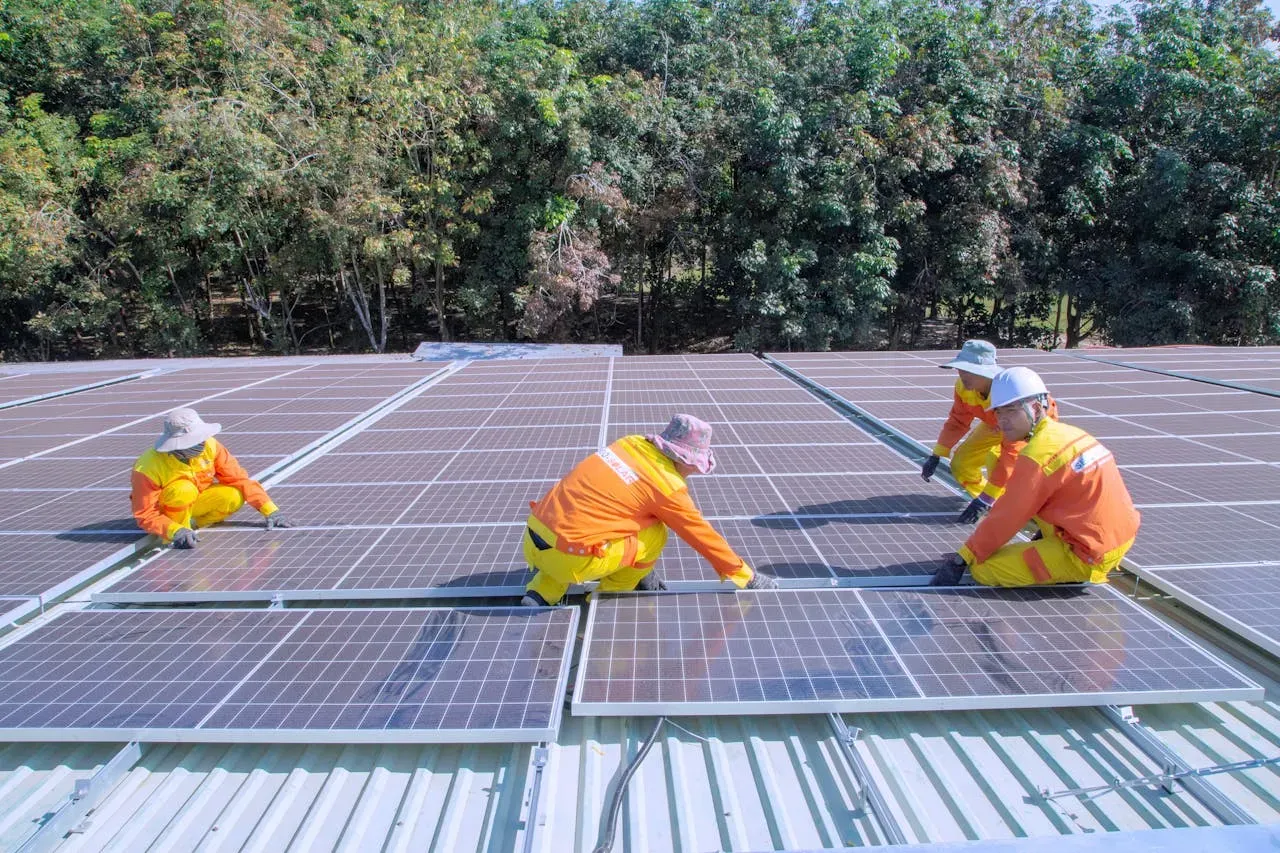Energy & Renewables Practice
Energy transitions demand exceptional legal counsel
Strategic Lateral Moves • Project Finance to Regulatory • Traditional to Renewable
Energy transitions demand exceptional legal counsel. The energy sector's unprecedented transformation creates unique opportunities for partners who navigate the intersection of traditional energy, renewables, and emerging technologies. Whether you're structuring complex project financings, navigating evolving regulatory frameworks, or advising on energy transition strategies, we understand the nuanced demands of energy law practice.
KiLawyers™ specializes in placing energy partners where platform capabilities, sector focus, and market position align with your expertise—from upstream oil & gas to offshore wind, from LNG to hydrogen economies.
What energy partners receive
- Sector-Specific Platform Analysis: Assessment of energy capabilities, key client relationships, and investment commitment across traditional and renewable sectors.
- Practice Integration Mapping: How your expertise enhances existing energy platforms—from project development to dispute resolution.
- Market Position Intelligence: Comparative analysis of firms' energy sector standing, recent mandates, and strategic priorities.
Understanding the Energy Legal Landscape
The Dual Transformation Challenge
Energy lawyers today operate at the convergence of two profound shifts: the global energy transition requiring massive infrastructure investment and regulatory evolution, alongside the ongoing complexity of traditional energy markets demanding sophisticated risk management and cross-border expertise. This creates unprecedented demand for partners who can bridge both worlds.
Platform Requirements for Energy Excellence
Successful energy practices require more than sector knowledge—they demand platforms with:
Core Capabilities
- • Multi-jurisdictional capabilities for cross-border project development
- • Deep bench strength across finance, regulatory, and disputes
- • Technology infrastructure for complex deal management
Strategic Advantages
- • Established relationships with developers, sponsors, and financial institutions
- • Industry network and thought leadership presence
- • Commitment to long-term sector investment
Why Energy Partners Move—Strategic Drivers
Energy partners seek new platforms when these critical factors indicate it's time for change.
Transition Commitment
Current firm lacks commitment to energy transition opportunities and emerging technologies
Platform Gaps
Platform gaps prevent full-service delivery on complex cross-border mandates
Geographic Reach
Geographic limitations restrict access to key energy markets and global opportunities
Compensation
Compensation structures don't reflect origination across practice areas and deal complexity
Cultural Fit
Cultural misalignment on long-term sector investment and strategic priorities
Strategic Assessment
We assess these factors before any market approach, ensuring alignment between your strategic objectives and platform capabilities.
Practice Areas We Serve
Project Development & Finance
From conventional power to offshore wind, we place partners who structure, negotiate, and close complex energy infrastructure transactions. Whether your focus is sponsor-side development, lender representation, or government advisory, we identify platforms where your expertise drives strategic value.
Key considerations: Deal flow sources, balance between traditional and renewable mandates, relationships with key financial institutions, and cross-border execution capabilities.
Regulatory & Commercial
Energy regulation's increasing complexity—from FERC proceedings to renewable energy certificates—demands sophisticated counsel. We work with partners navigating transmission access, power purchase agreements, environmental permitting, and market design across deregulated and regulated markets.
Platform requirements: Regulatory bench depth, government relations capabilities, industry association presence, and ability to influence policy development.
Oil & Gas
Despite transition pressures, traditional energy remains critical. We place partners across upstream exploration, midstream infrastructure, LNG development, and downstream operations—identifying firms maintaining strong hydrocarbon practices while building transition capabilities.
Strategic factors: Commitment to oil & gas amid ESG pressures, international arbitration strength, relationships with NOCs and IOCs, and emerging markets presence.
Energy Transition & Climate
The intersection of energy, ESG, and climate creates new practice opportunities. We work with partners advising on carbon markets, hydrogen economy development, CCUS projects, and sustainable finance—placing them where innovation meets execution capability.
Critical alignments: Firm's ESG positioning, cross-practice collaboration, technology sector overlap, and commitment to emerging energy technologies.

Global Energy Infrastructure Development
Complex cross-border projects demand sophisticated legal platforms
Market Dynamics Shaping Energy Practice
Current Demand Drivers
Renewable Development Acceleration
- • Offshore wind reaching commercial scale globally
- • Solar-plus-storage transforming project economics
- • Grid infrastructure investment at historic levels
- • Green hydrogen moving from pilot to commercial
Traditional Energy Evolution
- • LNG infrastructure expansion continuing globally
- • Upstream consolidation creating complex M&A
- • Decommissioning obligations driving new work streams
- • Energy security reshaping government priorities
Regulatory Complexity Intensifying
- • Permitting reform efforts across major markets
- • Transmission planning and cost allocation disputes
- • Carbon pricing mechanisms proliferating
- • Supply chain regulations affecting project development
Geographic Opportunities
Established Markets
New York, Houston, Washington D.C., London
Growth Centers
Austin, Denver, San Francisco, Paris
Emerging Hubs
Dubai, Singapore, Frankfurt, Tokyo
Market Advantages
Each market offers distinct advantages—from regulatory work in D.C. to project finance in New York, from traditional energy in Houston to cleantech in San Francisco.
What Distinguishes Elite Energy Platforms
Integrated Service Delivery
Top energy platforms provide seamless coordination across project finance, M&A, regulatory, tax, and disputes. They staff matters with dedicated energy lawyers, not generalists, ensuring sector-specific expertise at every stage.
Global Execution Capability
Cross-border energy projects require coordinated multi-jurisdictional advice. Leading firms maintain energy specialists across key markets, enabling consistent service delivery from project conception through operation.
Sector Investment Commitment
Elite platforms invest in energy beyond individual partners—dedicated sector leaders, regular industry engagement, thought leadership investment, and long-term market presence regardless of cycles.
Technology & Innovation
Modern energy practice demands sophisticated technology for project management, due diligence automation, and document management. Leading firms invest in platforms that enhance efficiency and client service.

Renewable Energy Transaction Closing
Where sustainability meets sophisticated deal execution
Integration Success for Energy Partners
The First 100 Days—Critical for Energy Practices
Energy lateral success requires deliberate integration planning:
Weeks 1-4
Foundation Setting
- Stakeholder introductions across energy and related practices
- Team integration: Establishing reporting lines and work allocation protocols
- Technology setup: Access to research platforms and document management systems
- Internal introductions: Meetings with key partners in related practices
Weeks 5-8
Building Momentum
- Cross-selling initiatives: Identifying immediate opportunities within platform clients
- Marketing activation: Bio updates, client alerts, and speaking engagements
- Practice group integration: Contributing to strategy and business development planning
- Knowledge sharing: Presenting on recent developments or significant matters
Weeks 9-12
Establishing Leadership
- Client development: Hosting roundtables or webinars for platform clients
- Strategic initiatives: Contributing to practice growth strategies
- Thought leadership: Publishing articles or client alerts on current issues
- Performance metrics: Establishing baseline metrics and growth targets
Why Integration Matters More in Energy
Energy practices are inherently collaborative—successful matters require coordination across multiple practices and offices. Integration failures limit access to platform resources, reducing ability to win and execute complex mandates.
Our 100-day plans address energy-specific integration challenges, ensuring you leverage full platform capabilities from day one.
Compensation Structures for Energy Partners
Understanding Energy Economics
Energy compensation reflects unique practice characteristics:
- • Long deal cycles requiring patient capital
- • Team-based origination across multiple practices
- • Episodic workflow with significant transactions
- • Cross-border coordination adding complexity
Evolving Credit Models
Progressive firms recognize energy practice realities through:
- • Origination credit for relationship development
- • Execution credit for project management
- • Cross-selling credit for practice area introductions
- • Retention credit for long-term client management
We ensure compensation discussions reflect your complete contribution, not just individual billings.

Energy Trading Floor Operations
Supporting the commercial dynamics driving modern energy markets
Critical Questions for Energy Partners
Before exploring opportunities, consider:
Platform Capabilities
- • Does the firm have genuine energy sector commitment beyond individual partners?
- • Can they staff complex matters without relying on generalists?
- • Do they maintain specialist capabilities across relevant jurisdictions?
- • Will they invest in sector presence during market downturns?
Cultural Alignment
- • How does the firm balance traditional energy with transition opportunities?
- • Will ESG positioning constraints limit client representation?
- • Does partnership appreciate long development cycles inherent to energy?
- • Can you influence sector strategy and investment decisions?
Economic Structure
- • Does compensation recognize multi-year project development?
- • How is credit allocated across practices on integrated matters?
- • Will guarantees provide runway for practice development?
- • Are there precedents for energy partner success?
We address these questions through comprehensive platform assessment before any market approach.
Success Stories—Patterns We've Observed
While maintaining complete confidentiality, we've identified patterns in successful energy lateral moves:
The Regional to Global Platform Move
Partners with strong regional practices gain access to global capabilities, transforming local relationships into international mandates.
The Regulatory to Transactional Expansion
Regulatory specialists join platforms with project finance strength, creating full-service offerings that win competitive mandates.
The Traditional to Transition Evolution
Oil & gas partners successfully reposition within firms committed to energy transition, maintaining existing clients while building renewable capabilities.
The Boutique to BigLaw Integration
Specialized energy partners join larger platforms, gaining resources and reach while maintaining sector focus.
Why KiLawyers for Energy Transitions
Sector-Specific Intelligence
We maintain current intelligence on energy platform capabilities, recent lateral moves, and strategic priorities. This enables targeted approaches to firms genuinely building energy practices, not opportunistic shopping.
Relationship Depth
Our consultants maintain relationships with energy practice leaders globally. We understand internal dynamics, investment appetite, and cultural nuances that determine lateral success.
Integration Expertise
Energy integration is complex—requiring coordination across practices, offices, and industry groups. Our structured approach addresses these complexities, protecting your investment in transition.
FAQs for Energy Partners
How do firms view traditional vs. renewable energy experience?
Leading platforms seek partners who understand energy markets comprehensively. Pure renewable or traditional focus can work, but versatility across energy spectrum typically commands premium positioning.
What about conflicts with energy clients?
Energy conflicts require sophisticated analysis—considering corporate families, project partnerships, and financing structures. We map potential conflicts early, identifying waivable issues and developing mitigation strategies.
How important is team portability in energy?
While valuable, team moves aren't essential. Many successful energy partners initially move solo, then build through strategic hiring. Platform capabilities often matter more than team size.
Can energy partners successfully move internationally?
Cross-border moves are increasingly common in energy, particularly for partners with sector expertise transcending jurisdictional boundaries. Success requires careful platform selection and integration planning.
Market Intelligence & Timing
Strategic timing maximizes your opportunities in the energy sector.
When Energy Partners Should Move
Before Market Shifts
Position ahead of sector transitions and regulatory changes
At Practice Inflection Points
When growth exceeds current platform capabilities
During Firm Strategic Changes
When energy commitment wavers or priorities shift
Following Team Departures
When platform gaps emerge and capabilities diminish
Current Market Conditions
The energy lateral market remains robust, with particular demand for:
Strategic Intelligence Advantage
We provide real-time market intelligence that informs every placement decision:
Platform Monitoring
- • Firm energy commitments and investment levels
- • Recent lateral movements and compensation trends
- • Geographic expansion and market positioning
Market Dynamics
- • Regulatory developments and policy shifts
- • Investment trends and capital flows
- • Technology adoption and practice evolution
Next Steps for Energy Partners
Ready to explore where your energy practice could thrive? Our process protects your confidentiality while providing actionable intelligence:
- • Confidential consultation to understand your practice and objectives
- • Platform assessment identifying strategic alignment opportunities
- • Consent-based approach to selected targets
- • Comprehensive support through transition and integration
Every engagement begins with understanding your specific situation—no templates, no mass approaches, just strategic counsel tailored to your energy practice.
For Law Firms—Building Energy Excellence
Seeking energy partners who advance your platform?
We identify and engage partners whose expertise, relationships, and vision align with your energy strategy. Every introduction is qualified for cultural fit, strategic alignment, and integration success.